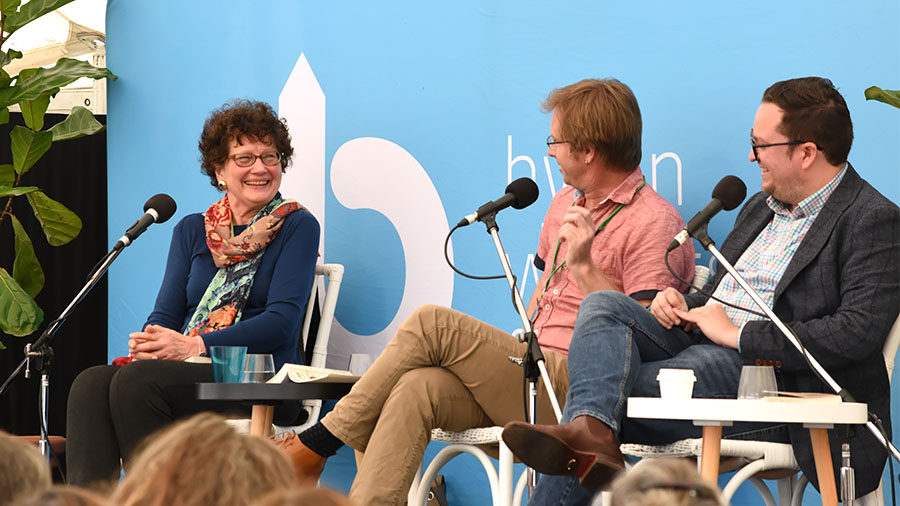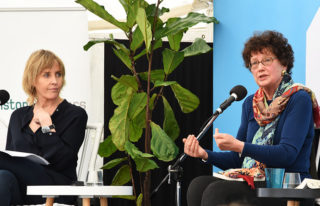Memoir: writing on the family

Writing a personal memoir takes strength of mind and soul. To talk publicly about the self and the life history of one’s own family, and the pain that may be attached to the past experiences, is a feat no one should dismiss as anything other than monumental.
Writers Vicki Laveau-Harvie, Rick Morton, and Andrew Stafford all show that they are capable of writing family memoirs full of the darkness and suffering, whilst also leaning towards the light-hearted humour that can silver-line all aspects of life.
Session chair Caro Llewellyn has also put herself through that journey with her first work of autobiography, Diving Into Glass.
Most writers attempting to create a memoir can say that the writing process takes a toll on the soul. It can dredge up the past in a way that, as Laveau-Harvie said, makes you ‘relive the whole process’.
So how does one write about trauma and past experiences without going into too much detail? How do you maintain a constant voice? Is what you’re saying even important, and will anyone ever read it?
For Laveau-Harvie, author of The Erratics, said ‘find[ing] your personality before you write your book’ was her way of tackling the challenge of voice.

She recommends writers should ‘just be yourself’ because ‘it’s a lot quicker’. This became her mantra and motto while writing The Erratics, a ‘dark, sharp, blackly funny and powerful’ memoir about herself and her sister and their journey through their parent’s decline of health.
The memoir picked up the 2019 Stella Prize and was shortlisted for the 2019 NSW Premier’s Literary Awards.
Laveau-Harvie said that writing about trauma involves understanding writing a ‘memoir is not a form of catharsis’. Instead, you find catharsis when you ‘climb a mountain, or run a marathon’. To her, catharsis is something ‘I don’t think you should share with others’.
Morton, a noted journalist and social affairs writer for the Australian, and author of One Hundred Years of Dirt, said that he still ‘forgets that what he writes will see the light of day’.
Morton said that his twenties were too chaotic to write, and that he ‘couldn’t commit’ to anything.
What he could have written back then would have been too full of anger, and that ‘if you write in anger, every word you write, the reader cannot trust’.
But when answering the audience’s question, ‘how do you write personal trauma in a way that’s relevant, without making it too overwhelming?’ he replied that the best thing to do is to ‘get away from self-pity when you acknowledge not everything was bad all the time’.
Good times do lighten the darkness for Morton, and through love between family members, inside jokes and personal strength people still find the reason to keep going.
Stafford, a freelance journalist and author of Brisbane-set Pig City, and the music memoir Something To Believe In, mentioned that finding his passions in music, writing about music, and birdwatching saved him.
To Stafford, music such as the American punk-rockers, Ramones was a ‘constant reassurance’ when going through difficult times. For him, being a ‘Ramones fan’ meant ‘never being alone’.
Through the ‘healing of music’, Stafford was ‘inspired to write in a way that is melodic’, and to ‘simply be myself on the page’ was his way of coping with the darkness surrounding the past.
In Stafford’s experience of writing his memoir, and facing the past, he was ‘just far out of the worst to write about it’. The entire book poured out of him within two months, Stafford said the book ‘just had to be written’.
Though the differences in authors’ experiences writing memoirs are wide, the intentions remain similar. Memoirs are about facing the past, facing your family and processing your past experiences, or expressing that process of understanding through a book form.
The form of the memoir, ultimately, engages the wide spectrum of readers and lets them know they are not alone in their experiences.
Sarvah Rayner is a Southern Cross University Creative Writing student. Southern Cross University students have reported on Byron Writers Festival since 2010. Find out where a degree from Southern Cross University can take you.
